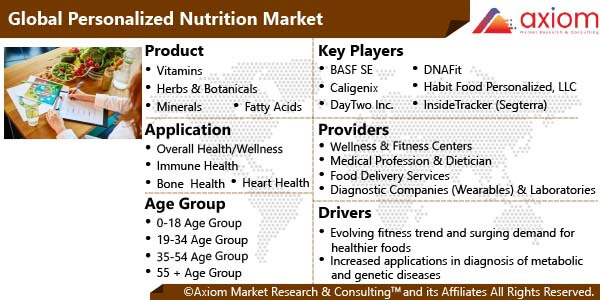Nutrigenetics is an aspect of personalized nutrition that studies the different phenotypic responses (i.e., weight, blood pressure, plasma cholesterol, or glucose levels) to a specific diet (i.e., low fat or Mediterranean diets), depending on the genotype of the individual. The overall goal of personalized nutrition is to preserve or increase health using genetic, phenotypic, medical, nutritional, and other relevant information about individuals to deliver more specific healthy eating guidance and other nutritional products and services. Personalized nutrition uses information on individual characteristics to develop targeted nutritional advice, products, or services to assist people to achieve a lasting dietary change in behaviour that is beneficial for health. It is based on the concept that individualized nutritional advice, products, or services will be more effective than more traditional generic approaches.
Global Personalized Nutrition Market Outlook
Recent growth of personalized nutrition market has been fuelled by four key factors including increased demand for customized experiences, greater appreciation for healthier foods and better fitness, the ability to track health data on daily basis using wearable solutions, and ongoing breakthroughs in personalized or precision medicines. The population of obese and overweight people is soaring globally, and the situation has necessitated the development of reliable weight-loss methods and routines. As consumer demand for such routines or services rises, players operating in the global personalized nutrition market will be provided with a newer set of growth opportunities. The trend is also expected to leverage growth opportunities for companies in the field of functional foods. However, need of well qualified physicians & safety considerations coupled with high cost of personalized nutrition products is hampering the market growth.
Personalized Nutrition Market Segmental Overview
The report analyses the global personalized nutrition market based on product, application, age group, providers and geography.
Personalized Nutrition Market by Product
Based on product, the market is segmented into vitamins, herbs & botanicals, minerals, proteins & amino acids, fatty acids, probiotics, fibers & specialty carbohydrates and others including prebiotics, carotenoids, glucosamine etc. Among these, the vitamins dominated the global personalized nutrition market in 2019. Vitamins are organic chemical compound which are found in tiny amounts in natural foodstuffs. They play an important role in recommending personalized nutrition, as they help in normal metabolism process, growth and vitality.
Personalized Nutrition Market by Application
The global personalized nutrition market, by application is segmented into overall health/wellness, immune health, bone health, heart health, skin, hair & nails, digestive/gastrointestinal health, joint health and others including eye health, mental health etc. The overall health/wellness segment dominated the global personalized nutrition market in 2019. The growth of overall health/wellness is driven by increasing consumer trend of personalized nutrition for overall fitness.
Personalized Nutrition Market by Age Group
By age group, the personalized nutrition market is segmented into 0-18 age group, 19-34 age group, 35-54 age group and 55 + age group. Based on age group, the 19-34 age group dominated the global personalized nutrition market in 2019. The growth of 19-34 age group segment is driven by increasing number of adult populations opting for personalized nutrition in developed countries.
Personalized Nutrition Market by Providers
By providers, the personalized nutrition market is segmented into wellness & fitness centers, medical profession & dietician, food delivery services and diagnostic companies (wearables) & laboratories. Based on providers, the diagnostic companies (wearables) & laboratories dominated the global personalized nutrition market in 2019. The growth of diagnostic companies (wearables) & laboratories segment is driven by increasing number of diagnostic companies offering personalized nutrition services in developed countries.
Personalized Nutrition Market by Geography
By geography, the global personalized nutrition market is studied across the countries of key regions such as, North America, Europe, Asia Pacific, and Rest of the world. North America accounted for the largest market share of personalized nutrition in 2019, dominated by the U.S. The growth in this region is supported by high incomes, world-class fitness and athletics infrastructure. The Europe also represents a major market for personalized nutrition, led by Germany, owing to increasing number of consumers opting for healthy lifestyles. Moreover, Asia-Pacific is the fastest growing market for personalized nutrition within the forecast period 2020 to 2026, fuelled by an increase in disposable incomes coupled with rapidly changing lifestyles. Moreover, Latin America and rest of the world are also expected to witness a healthy growth in this market within the forecast period.
Personalized Nutrition Market Key Players
Many companies, from start-ups to multi-nationals, invest in research on personalized nutrition. Most of the products currently present on the market have been developed by start-up companies that are in some cases fuelled by interdisciplinary cooperation’s in science hubs. The key competitors of this market include BASF SE, Caligenix, Care/of, DayTwo Inc., DNAFit, Genomix Nutrition, Inc. (GX Sciences, Inc.), Habit Food Personalized, LLC, InsideTracker (Segterra), Lonza, Metagenics, Inc, Mixfit Inc. (DSM), Nutrigenomix Inc., Telomere Diagnostics, Inc (TeloYears), Orig3n, Pure Encapsulations, SDC Nutrition Inc., STYRLABS, Vitagene, Vitamin Packs, Inc., and Zipongo. In July 2018, Royal DSM, a global science-based company, acquired an equity stake in Mixfit Inc. This investment builds on the previously announced partnership between DSM & Mixfit and combines DSM’s unparalleled expertise in essential micronutrients with the technological edge of Mixfit to analyze health data in real-time, address nutritional gaps in an effective way.











